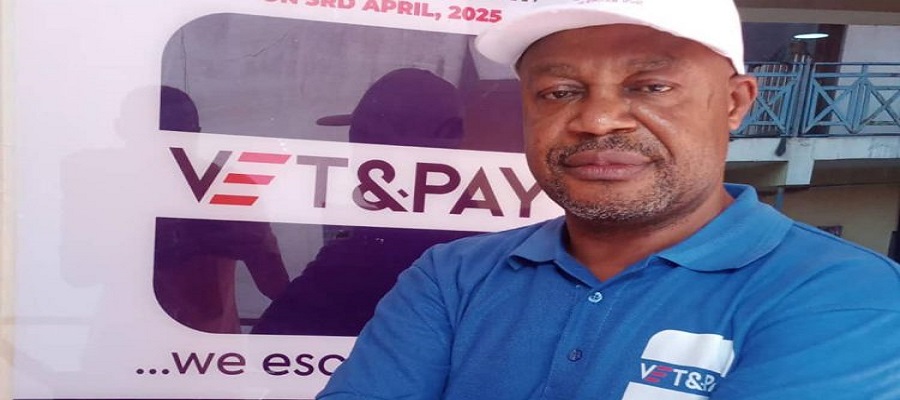E-Financial
Fintechs Key to Bridging Financial Inclusion Gap in Africa

By Ebehijie Momoh, SVP, General Manager West Africa,
With many countries across the globe still under lockdown, perhaps more than ever before, there is a dire need to strengthen financial institutions and develop robust payment systems. This has become pertinent not only to keep people safe, but also as a means to extend financial inclusion, especially among the vulnerable in this challenging economic environment.
Earlier today, The Economist Intelligence Unit launched a report titled State of play: Fintech in Nigeria, sponsored by Mastercard and MTN Group. The report examines the key trends in Nigeria’s fintech sector and assesses both industry drivers and impediments to further growth.
Some of the key takeaways from the report are:
- Nigerian fintechs are branching out from payments into lending, micro-investment, wealth management, peer-to-peer transfers and insurance. Payments and remittances are the most developed sub-sector to date. The country has seen a surge of new and simplified apps to help merchants, businesses and consumers. Mainstream banks, initially slow to react to the digital era, have quickly adapted to offer apps and tools in areas like loans, while non-traditional players—including telecom companies and retailers such as supermarkets—are entering the finance space.
- Nigeria’s regulatory environment balances innovation and consumer protection but must continually evolve to respond to market dynamics.The Central Bank of Nigeria has passed laws and regulations to promote digital payments and allow more actors to enter the space, boosting competitiveness and consumer choice. But it is balancing these with consumer protections through its cybersecurity framework and data protection regulation. Recent reforms, such as easing entry of start-ups into the capital markets and the creation of a fintech sandbox, could also lead to an enrichment of the ecosystem. While there is no fintech-specific law as yet, a sector roadmap provides overarching direction to the industry. A legal framework may prove necessary to manage the emergence of new types of fintech and accelerate fintech solutions for “insurtech” and wealth management.
- To develop and flourish, Nigerian fintech needs to address shortcomings in the broader ecosystem. While venture capital investment is forthcoming, the majority comes from abroad with Nigerian investors currently playing a small role. As the sector matures, skills gaps are emerging outside of product development in areas such as business management and marketing. Given the challenges that fintechs in all markets are facing in terms of profitability, expertise in business management and corporate governance is needed. Some experts question whether fintech has truly moved the needle on financial inclusion, believing that it is easing financial transactions for those already in the system. But the jury is still out. Although a causal link with the rise of fintech is unclear, surveys conducted by Enhancing Financial Innovation and Access, a financial sector development organisation, reveal that the percentage of financially-excluded adults in Nigeria reduced from 41.6% in 2016 to 36.8% in 2018.
As a global fintech leader, Mastercard is proud to support Nigeria and the rest of Africa in digitization efforts for a more inclusive economy. The Fintech in Africa story is already one of the world’s greatest tech-success stories — Africa’s fintech industry is expected to be worth more than $3bn in 2020 (according to Ecobank research). And according to a 2016 study, The long-run poverty and gender impacts of mobile money, fintechs have lifted almost 200,000 households out of extreme poverty, and enabled almost the same number of women to move from subsistence farming into business.
At Mastercard, we believe that fintechs are contributing to the rapid digital transformation that makes lives more convenient, simpler, and rewarding – especially across Africa.
We firmly believe that fintechs, and subsequently financial inclusion can drive growth and prosperity. This is why we have pledged to bring a total of 1 billion people and 50 million micro and small businesses across the globe into the digital economy by 2025. As part of this effort, there will be a direct focus on providing 25 million women entrepreneurs with solutions that can help them grow their businesses.
To further simplify the way we work with fintechs, in 2019 we launched Mastercard Accelerate, a global initiative that also gives them access to everything they need to grow quickly. Offering a simple, single entry-point to our company’s wide portfolio of specialized programs, Mastercard Accelerate gives start-ups and emerging brands support and assistance for every stage of their growth and transformation, from market entry to global expansion.
Accelerate comprises a range of award-winning programs that have helped participants all over the world access and benefit from Mastercard’s ecosystem, customers and innovations. These are Mastercard Fintech Express, Mastercard Engage, Mastercard Start Path and Mastercard Developers.
- Mastercard Fintech Express – Provides easy access to a customized set of rules, relevant resources and digital-first services designed to address the unique needs of fintechs and enable program launch and global expansion with speed.
- Mastercard Engage – Connects fintechs to thousands of Mastercard technology partners, making it quicker and easier to work together. We launched this in Lagos and Nairobi in April 2019 with hundreds of fintechs already signed to our platform.
- Mastercard Start Path– Invites later-stage startups to participate in a 6-month program, providing opportunities to scale and secure strategic investments.
- Mastercard Developers – Provides APIs for everything, empowering engineers with the ability to access Mastercard payment, security and analytics services via simple, user-friendly documentation, SDKs and sample code for the top programming languages.
I personally love what we are doing with Start Path where we invite later-stage startups to participate in a 6-month program, providing opportunities to scale and secure strategic investments. More than 200 companies have participated in the Start Path’s program since its founding in 2014 and those companies have collectively gone on to raise $1.5B in capital. Across Africa, over five African fintech’s including three from Nigeria have run through this programme including MAX.ng, Flutterwave, Netplus, Kasha, Mfarmpay, Lidya and Lipa Later.
Nigeria is rapidly progressing in the digital space – becoming increasingly more connected. Through our programs with fintechs, we are bringing together an ecosystem of key players at different touchpoints. Together, we are delivering innovative digital solutions that have a far-reaching impact and realize the true potential of inclusive growth across the country. This is the future and we are here for it.
E-Financial
AfDB Mobilizes $2.2Bn to Support Nigeria’s Agriculture

African Development Bank (AfDB) is mobilising $2.2 billion to develop agricultural processing zones in 28 states in Nigeria to boost food security and create jobs, Akinwumi Adesina, the bank’s president said on Tuesday.

Adesina was speaking in northern Kaduna state while launching the first phase of the initiative that is targeting five states. This phase is being bankrolled by more than $500 million that was first announced in 2022.
The AfDB head said the funding needs for the second phase would be presented to the AfDB board shortly for approval.
“We have been able, I would like to say, to mobilize $2.2 billion of investment interest to support the second phase across Nigeria,” he said during the ceremony in Kaduna.
Adesina said besides the AfDB, Arab Bank for Economic Development, Africa Import-Export Bank, agri-investment fintech Sahara Farms and French and U.S. institutions were among institutions that would help raise the $2.2 billion.
The agro-processing zones aim to create facilities to process agricultural produce closer to farmers, which will reduce post-harvest losses and strengthen value chains from farms to market.
Last year, Nigeria spent $4.7 billion importing food, the AfDB said, a trend authorities also hope to reverse with more investment in the farming sector.
E-Financial
Court Delays $81.5Bn Tax Evasion Case against Binance

Nigerian authorities have postponed legal proceedings against Binance as tensions persist over the crypto exchange’s role in the country’s economic troubles.

According to a recent report, a court in Nigeria has pushed back the tax evasion case to April 30.
The delay gives the Federal Inland Revenue Service (FIRS) more time to respond to Binance’s request to cancel a previous court order that allowed legal documents to be served to the company via email.
The FIRS initially filed the lawsuit in February, claiming Binance owes the country a whopping $2 billion in taxes along with an additional $79.5 billion in economic damages.
Related court filings reveal that the agency is pushing for the exchange to pay corporate income taxes for the years 2022 and 2023.
On top of that, FIRS has demanded a 10% annual penalty on the unpaid taxes and nearly 27% interest on the outstanding amounts.
The agency has argued that Binance’s level of business activity qualifies as a “significant economic presence” in Nigeria, thereby making it liable for taxation under local law.
Binance, however, has challenged the court’s earlier decision to allow the order to be served via email.
According to Chukwuka Ikwuazom, Binance’s attorney, the order should be annulled, as Binance is registered in the Cayman Islands, has no physical office in Nigeria, and was served without proper court authorisation for cross-border delivery.
Since expanding its services to Nigeria on October 24, 2019, with the addition of Naira, Binance’s journey in the West African country has been marred with regulatory pushback.
Things came to a head in February 2024 when two Binance executives, Tigran Gambaryan, a US citizen, and Nadeem Anjarwalla, a British-Kenyan national, were unexpectedly detained by Nigerian authorities.
The executives had travelled to Abuja for what was supposed to be a series of meetings with government officials to address concerns around Binance’s local operations.
Instead, they were arrested and charged with tax evasion and money laundering.
The situation took a dramatic turn when Anjarwalla escaped custody in March and fled the country, reportedly making his way to Kenya, where he remains at large.
Gambaryan, however, stayed behind bars for months.
As previously covered on Invezz, reports soon started to surface that Gambaryan was suffering from pneumonia, malaria, and a herniated spinal disc, all while allegedly being denied proper medical attention.
His detention caught the attention of US lawmakers, which even led Representative Rich McCormick to introduce a resolution in July 2024 that classified his arrest as a hostage situation.
By October, the Nigerian government dropped the money laundering charges against Gambaryan, leading to his release on October 23, 2024.
He returned to the US the same month, bringing an end to a nearly seven-month-long detention.
In between, Binance officially halted all naira-related services and exited the Nigerian market in March 2024.
E-Financial
TCL Launches ‘vetandpay’ to Combat Online Transaction Fraud

Tradewyse Concepts Limited (TCL), Nigeria-based technology solution provider has launched a product called “vetandpay” to address the issues of trust and fraud in online business transactions in the country.

Dr Kalu Ibe, founder and chief executive officer, Tradewyse Concepts Limited
Dr Kalu Ibe, founder and chief executive officer, Tradewyse Concepts Limited, stated that the software was proudly developed by a team of Nigerians.
Speaking at the product dedication ceremony in Abuja, Ibe explained that the app aims to reduce corruption by restoring trust and integrity. He added that it would inspire confidence in both business and the broader transactional environment in Nigeria.
“Today, I present vetandpay.ng, powered by Vetandpay Technologies Ltd, Africa’s foremost escrow company, a subsidiary of TCL,” Ibe said.
“What started as a spark two years ago is now shining brightly over Nigeria’s transactional space, bringing healing with its rays.”
He outlined the various escrow services offered, including auto purchase escrow, procurement escrow, service-based escrow, e-commerce escrow, and property escrow, with more services expected to be added.
Ibe emphasised that the service is available to Nigerians both at home and abroad, promising zero losses in all business transactions when using vetandpay.
Through its Corporate Social Responsibility (CSR) programme, TCL plans to initiate a comprehensive tech training programme for teenagers in Nigerian schools. Ibe highlighted that the initiative aims to equip young people with technological skills, preparing them to enter the digital economy and drive innovation.
Ntufam Ugbo, project director, commented that vetandpay is transforming the business landscape in Nigeria by building trust between buyers and sellers.
“What vetandpay does is act as a middleman between the buyer and the seller,” she said.
Mrs Rachel Samuel, head of Customer Service at vetandpay, described the platform as a secure payment solution designed to eliminate fraud in online transactions.
“Our basic goal is to address the issue of receiving something different from what was ordered,” she explained.
Referring to a report by the Federal Trade Commission, Samuel pointed out that consumers lost over 8.8 billion dollars to fraud in 2022, a 30 per cent increase from the previous year. She noted that with vetandpay, both parties to a business transaction could have peace of mind and zero losses.
She encouraged Nigerians to embrace the services provided by the platform by downloading the vetandpay app and using the technology to secure their transactions.
‘‘Today marks the beginning of a new era in secure online transactions. Whether you are a business owner, freelancer, or everyday buyer, vetandpay is here to protect your hard-earned money,” Samuel concluded.

 News2 days ago
News2 days agoAOT Issues Bench Warrant against Sanusi, Aero Contractors MD

 News2 days ago
News2 days agoUS Cancels Visas for All South Sudanese Passport Holders

 News2 days ago
News2 days agoMeningitis Outbreak Kills 151 in Nigeria – NCDC

 News2 days ago
News2 days agoSERAP Calls on Tinubu to Reject $1.08Bn Loan, Probe Missing Funds

 News2 days ago
News2 days agoAfrimash Launches USSD Code to Revolutionize Poultry Farming and Combat Counterfeit Farm Produce

 General News2 days ago
General News2 days agoUniversity Don Seeks Ban of Smartphones, Social Media in Schools

 News1 day ago
News1 day agoFG to Invest in Cutting-edge Broadcast Technology

 General News2 days ago
General News2 days agoAmid Rising Investor Confidence in Nigeria, Woodhall Capital Foundation Trains Captains of Industry























